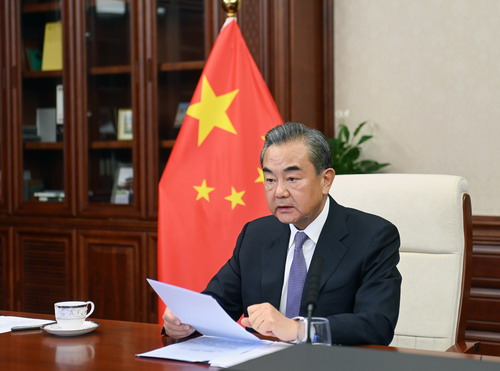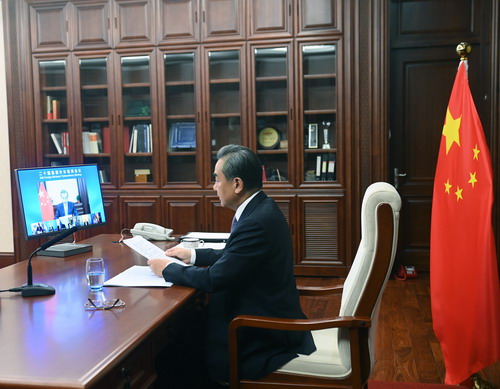
People’s Republic of China



On the evening of 3 September, State Councilor and Foreign Minister Wang Yi attended the G20 Extraordinary Foreign Ministers’ Meeting from Beijing. The meeting was chaired by Foreign Minister Prince Faisal bin Farhan Al Saud of Saudi Arabia, which holds this year’s G20 presidency. Foreign ministers or representatives of the G20 countries as well as guest countries, joined by heads of international organizations, attended the meeting.
Wang noted that the global pandemic is compounding the once-in-a-century changes unfolding in our world. Unilateralism, protectionism, and headwinds against globalization are on the rise, leading to growing uncertainty and volatility in the international landscape. Multilateralism is the only way forward to meet these challenges. Countries need to uphold the international order underpinned by international law and reinforce the UN-centered international system. As the world is about to mark the 75th anniversary of the UN, China calls for renewed commitment to multilateralism and to the UN. “We must come together to advance global governance in the post-COVID-19 era and build a community with a shared future for mankind,” said Wang.
Wang stressed that while COVID-19 is still raging in many parts of the world, countries face the pressing task of restoring global growth, for which the flow of goods and people must be resumed as soon as possible.
To that end, he put forward a number of proposals for G20 cooperation:
Gradual expansion of orderly people-to-people exchanges on the basis of guaranteeing health and safety, through policy coordination and new cooperation mechanisms;
Enhanced information sharing on epidemic response, conduct pre-departure nucleic acid testing, and adopt mutual recognition of testing results and health codes;
Establishment of more green lanes for transporting goods to make customs clearance more efficient and keep industrial and supply chains undisrupted. It is also important to explore the feasibility of zero-tariff treatment for crucial medical supplies.
Wang said that China would like to launch, together with other members, an initiative on facilitating cross-border flow of people and goods, to synergize the existing bilateral and regional arrangements for international movements. China looks forward to active participation by other G20 members.
Wang then called on G20 countries to strengthen solidarity and cooperation to ensure a fruitful Riyadh Summit.
Specifically, the G20 needs to make the vaccines accessible and affordable. The coordinating role of WHO should be exerted in this regard to form greater synergy between the relevant mechanisms. China is working with 11 countries on phase-three clinical trials of COVID-19 vaccines. When available, China will share its COIVD-19 vaccine with other countries and make it a global public good, as pledged by President Xi Jinping.
The G20 also needs to unlock the potential of digital economy. China is actively considering putting forward an initiative on data security, and calls for all parties to build an open, fair and non-discriminatory business environment and maintain the supply chain security of global ICT products and services.
Last but not least, the G20 must step up support for countries hardest hit by the coronavirus and under heavy financial stress, including by further extending the period of debt suspension.
Participants all shared their views on COVID-19 response cooperation, travel facilitation and border management.
They agreed that facing economic recession and restricted cross-border flow of people and goods caused by the pandemic, the G20 must lead the efforts and strengthen cooperation to overcome the fallout of the pandemic and revitalize the global economy.
The participants highlighted the need to strengthen solidarity and cooperation, share information and best practices, and collaborate on the research and development of vaccines to safeguard global public health.
They agreed on the need to facilitate international movements and flow of goods in a COVID-secure way, so as to restore growth in the global economy.



